 Global| Apr 09 2010
Global| Apr 09 2010U.S. Unemployment By Age,Race,Gender & Schooling
by:Tom Moeller
|in:Economy in Brief
Summary
The U.S. unemployment rate has lingered near 10% since last summer. As if that's not bad enough news, the detail behind the total paints a picture of an even graver economic situation. The current range of the unemployment rate is [...]
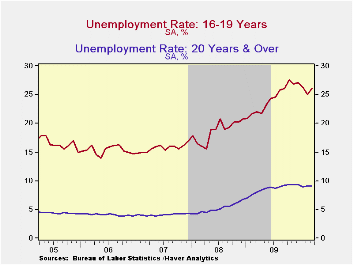
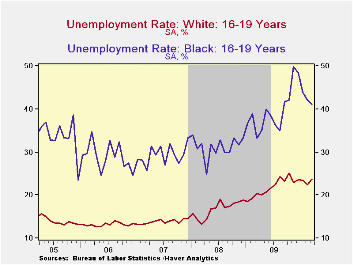
The U.S. unemployment rate has lingered near 10% since last summer. As if that's not bad enough news, the detail behind the total paints a picture of an even graver economic situation. The current range of the unemployment rate is 7%-to-47% in the U.S. depending on age, race and sex. But many other variables matter greatly for the level of unemployment amongst certain groups.
The unemployment rate for adults, aged 20 or over, currently
is 9.1%. That is lower than the total, but it's still more than double
the rate from 2005 to 2007. Here, however, is where a further breakdown
of the numbers reveals even more notable divergences in unemployment. 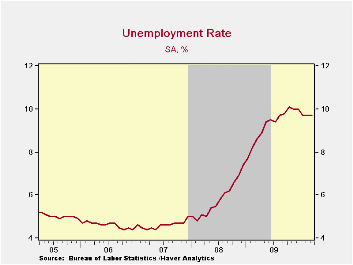 Let's begin by looking further at age. For
teenagers, the unemployment rate is a relatively high 26.1% and that's
up from roughly 15% in 2006. But the adult female unemployment rate is
a lower at 8.0%, though that is double the 2007 low. The adult male
unemployment rate is 10.0%, roughly equal to the total.
Let's begin by looking further at age. For
teenagers, the unemployment rate is a relatively high 26.1% and that's
up from roughly 15% in 2006. But the adult female unemployment rate is
a lower at 8.0%, though that is double the 2007 low. The adult male
unemployment rate is 10.0%, roughly equal to the total.
The figures by race versus age & gender diverge greatly. At the low end of the unemployment scale are white individuals with an 8.8% rate, though that is more than double the average from 2005 to 2007. Again, the rate for adult females is lower at 7.3%, compared to 8.9% for adult white men. For blacks, the numbers rise significantly. The unemployment rate amongst blacks and African Americans is up to 16.5% from the 8.3% low in 2007. Again, female black unemployment is lower than that of males at 13.2%, compared to 20.2% for men. But the grown-ups, as usual, are better off. Unemployment amongst adult blacks amounted to 15.5%. Though that was double the 2007 low, the rate for black teenagers was an eye-popping 41.1%. If you're male and a teen the rate jumps higher to 47.4% from 32.5% in 2006.
As might be expected, the level of educational attainment matters when it some to employment. The unemployment rate for individuals who either took some college courses (8.2%) or received a BA or higher (4.9%) suggest that preparation for a professional career pays off. These numbers ignore, of course, the payoff to folks who seriously prepare for a skilled-labor position. For adults with less than a high school diploma, the relatively high unemployment rate of 14.5% is up from the 7.0% low in 2006-07.
Unemployment data are available in Haver's USECON & EMPL databases.
The Labor Market in the Great Recession from the Federal Reserve Bank of San Francisco is available here here.
The Economic Outlook is the title of yesterday's speech by Fed Vice Chairman Donald L. Kohn and it can be found here here.
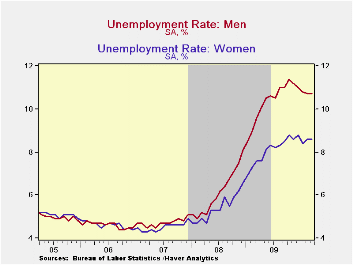
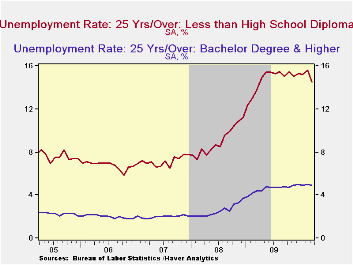 >
>
| Unemployment Rate (%) | March | February | January | March '09 | 2009 | 2008 | 2007 |
|---|---|---|---|---|---|---|---|
| Total | 9.7 | 9.7 | 9.7 | 8.6 | 9.3 | 5.8 | 4.6 |
| 16-19 Years | 26.1 | 25.0 | 26.4 | 22.0 | 24.3 | 18.7 | 15.7 |
| White | 23.7 | 22.5 | 23.5 | 20.3 | 21.9 | 16.7 | 13.9 |
| Black or African American | 41.1 | 42.0 | 43.8 | 33.1 | 39.6 | 31.2 | 29.4 |
| 20 Years & Over | 9.1 | 9.1 | 9.0 | 8.0 | 8.7 | 5.2 | 4.1 |
| White | 8.1 | 8.2 | 8.1 | 7.4 | 7.9 | 4.7 | 3.6 |
| Black or African American | 15.5 | 14.8 | 15.3 | 12.7 | 13.7 | 9.1 | 7.2 |
by Robert Brusca April 9, 2010
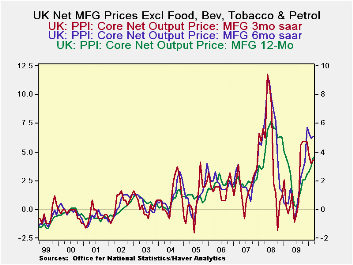
UK MFG inflation trends are still running hot with the release of the PPI for March. Commodity prices are still rising, adding to the pressure with Brent prices up by 7% in the March and other commodity prices rising as well. Coupled with weakness in sterling, inflation has a real foothold in the UK. The BOE has an inflation ceiling but that applies to its Consumer price measure, not the PPI. Still, with this kind of pressure on producer prices it is hard to conclude that the CPI will be out of the woods anytime soon.
In terms trends in the PPI, The various sequential rates of growth all are elevating but the three month rate is below the six month rate for both the core and the headline rates indicating that it is not a pure acceleration for inflation But the Core rate is still slightly above its Yr/Yr pace and that is not a good sign. Inflation trends in the UK could be worse but they could be a lot better too. There is not much in this report that is reassuring if you are at the Bank of England trying to decide on policy.
On top of these poor trends there is also pressure from input prices that were up exceptionally strongly in March. While the UK has posted some better growth numbers recently the BOE is still helping the markets with securities purchases. The last thing it needs is for inflation to become more unstable. Inflation is already pushing the limits of BOE tolerance for the CPI. Any further pressure would really put the BOE between a rock and hard place.
| UK PPI MFG net output prices | |||||||
|---|---|---|---|---|---|---|---|
| %M/M | %SAAR | ||||||
| Mar-10 | Feb-10 | Jan-10 | 3-mo | 6-mo | 12-mo | 12-moY-Ago | |
| MFG | 0.6% | 0.4% | 0.2% | 4.9% | 6.7% | 5.0% | 2.0% |
| Core | 0.6% | 0.3% | 0.2% | 4.3% | 5.1% | 3.6% | 3.2% |
| Core: ex food beverages, tobacco & Petroleum | |||||||
Tom Moeller
AuthorMore in Author Profile »Prior to joining Haver Analytics in 2000, Mr. Moeller worked as the Economist at Chancellor Capital Management from 1985 to 1999. There, he developed comprehensive economic forecasts and interpreted economic data for equity and fixed income portfolio managers. Also at Chancellor, Mr. Moeller worked as an equity analyst and was responsible for researching and rating companies in the economically sensitive automobile and housing industries for investment in Chancellor’s equity portfolio. Prior to joining Chancellor, Mr. Moeller was an Economist at Citibank from 1979 to 1984. He also analyzed pricing behavior in the metals industry for the Council on Wage and Price Stability in Washington, D.C. In 1999, Mr. Moeller received the award for most accurate forecast from the Forecasters' Club of New York. From 1990 to 1992 he was President of the New York Association for Business Economists. Mr. Moeller earned an M.B.A. in Finance from Fordham University, where he graduated in 1987. He holds a Bachelor of Arts in Economics from George Washington University.






